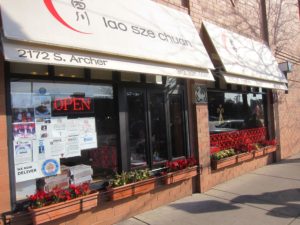
Orland Park, Illinois (ECWd) –
In an update to an ongoing story, the Orland Park Public Library continues to refuse to produce a receipt for $96.50 that was spent at the Chicago restaurant Lao Sze Chuan on 6/23/17; the OPPL was asked to produce this receipt in a Freedom of Information Act request in July to account for employee spending on food and beverage, but instead of producing an actual receipt with an itemization of everything purchased or ordered at Lao Sze Chuan, the OPPL instead produced a credit card “Customer Copy” charge slip with merely the total spent at Lao Sze Chuan that day (and not an itemization of what was ordered, in terms of any food or drink or other goods or services).
An argument can be made that the OPPL did not comply with the FOIA request for the receipt for this spending since a receipt is defined by the Illinois state legislature as a listing of items purchased by a public body and their costs. A receipt, for government spending, is not merely a piece of paper showing a final total, such as a Customer Copy credit card charge slip. A receipt must contain a description of exactly what was purchased and its cost to taxpayers.
After several Requests for Review were filed pertaining to the OPPL refusing to produce this receipt, the state’s Public Access Counselor’s office became involved in early August and asked the Orland Park Public Library to contact the restaurant Lao Sze Chuan to obtain a copy of the receipt that accounts for the $96.50 spent on 6/23/17. The OPPL refused to comply.
The Orland Park Public Library admits that Lao Sze Chuan has a copy of this receipt and also acknowledges that the OPPL could obtain such a copy from this third party any time it asked. However, the OPPL suspiciously claims it is not in possession of the printed, itemized receipt that a Lao Sze Chuan waitress gave to Library Director Mary Weimar on 6/23/17 and refuses to obtain a replacement copy, even when the Attorney General’s office politely asks them to resolve this matter by doing just that.
According to the OPPL’s salary chart for 2017, Mary Weimar has an annual compensation package of nearly $200,000/year. She charged $96.50 at a restaurant, expects the public to pay for that, and refuses to produce a receipt with an itemization of what she ordered at the restaurant. If Weimar, or any other public employee, wishes to hide what she eats or drinks when out living it up in a restaurant then the best course of action would be to pay for meals such as those out of her own pocket and not expense them to the public. If taxpayers have to foot the bill then taxpayers have the right to see if anything questionable was purchased by a public employee and evaluate if the spending was sensible and prudent.
Does Illinois law governing travel expenses allow for a public body to hide itemization of purchases from public scrutiny because a public employee is embarrassed to show what she purchased?
An argument can be made that the OPPL is attempting to create a loophole where it can hide its spending from the public’s oversight by destroying receipts with itemizations and instead only producing more-generically-printed credit card charge slips that only show the final total (but have no information about what was ordered and, thus, can’t be used to determine whether or not public employees were purchasing alcohol with public funds).
The Local Government Travel Expense Control Act (50 ILCS 150/1) was enacted on 1/1/17 and requires public employees to obtain approval for their spending in advance of the spending and to produce receipts for that spending to the public body once those receipts enter into the possession of a public employee. It can be argued that the OPPL is noncompliant with 50 ILCS 150/1 in the matter at hand. Weimar’s excursion to Lao Sze Chuan does not appear to have been approved in advance, as far as current documents show, and nowhere in any documentation is there information about any other people being involved in this restaurant expense other than Weimar herself. If other OPPL employees or Board Members were present at Lao Sze Chuan eating or drinking, the statute appears to require their names and job titles to be identified on the reimbursement paperwork in addition to Weimar’s. No such names appear, so the public is forced to assume that Weimar was out spending the public’s money alone on 6/23/17 (and thus grossly exceeding her $35/day maximum under GSA spending rules).
The Illinois Local records Act (50 ILCS 205/) states in Section 4 that “all public records made or received by, or under the authority of, or coming into the custody, control or possession of any officer or agency shall not be mutilated, destroyed, transferred, removed or otherwise damaged or disposed of, in whole or in part, except as provided by law. Any person who knowingly, without lawful authority and with the intent to defraud any party, public officer, or entity, alters, destroys, defaces, removes, or conceals any public record commits a Class 4 felony.”(Emphasis added.) Here, an argument can be made that Mary Weimar was in possession of a receipt for her $96.50 spending at Lao Sze Chuan after the waitress in the restaurant presented her with a receipt showing an itemization of everything that was ordered. Weimar took possession of that receipt from the waitress, looked at it, produced a credit card to pay for the purchase, handed that credit card to the waitress and the waitress later returned with a Customer Copy credit card charge slip that Weimar retained (and produced pursuant to the FOIA request). It appears that Weimar may have intentionally destroyed the receipt with the itemization after it entered into her possession, seemingly so that the public could never see what she ordered and spent public funds on at Lao Sze Chuan. Since the OPPL has refused to provide any other clarification or explanation, this is what the public is left to assume.
But the Illinois State Legislature did not intend to create such a loophole for public employees to evade scrutiny. What’s to stop every public employee in the state from trying this trick themselves and ringing up thousands of dollars in alcohol, steak, and lobster purchases…then claiming they (conveniently) “lost” the receipt and allowing them to instead just produce generic credit card charge slips that show only the final totals and not the extravagant items ordered?








13 Comments
Mitch
Posted at 12:55h, 07 AugustAn argument can be made that OPPL is doing exactly what they are allowed to do by law.
jmkraft
Posted at 13:16h, 07 AugustWe will let the courts figure that out…I think OPPL will lose again.
James J Pancrazio
Posted at 09:35h, 06 AugustIf the receipt in question is the one that reads “pre-auth” on it, it sounds as if this was pre-authorized. Does this mean that there is a “tab” at the restaurant?
Kevin duJan
Posted at 19:24h, 06 AugustI have eaten at Lao Sze Chuan many times and I paid by credit card always. Here is what happens: when you are done with your meal, they bring you a check with everything you ordered on it. And then they ask you how you want to pay. If you give them a credit card, they take your card and go to the computer and then come back with another two slips: one says Customer Copy and the other is Merchant Copy. These are “pre-auth” for the charge but it’s not the final total because they are waiting to see how much you leave as a tip. But the restaurant asked the credit card company if your card works and the credit card company tells the restaurant your card is “pre-authorized” for a charge (and is awaiting the final total with the tip). Once you leave the table, you leave behind the signed Merchant Copy with whatever tip you want to give and you put down a total and that’s what the final charge will be.
James J Pancrazio
Posted at 09:28h, 06 AugustAt my institution, we are supposed to present itemized receipts. However, if those original receipts get lost one can submit a notarized affidavit that attests that there was a receipt, itemizing what it covered, indicating if tip or tax was included, and indicating whether or not alcohol was purchased. Not sure if there is a way around itemization.
Deborah
Posted at 21:20h, 05 AugustKevin Dujan, have you read John Kraft’s posts about the Village of Wheeling? Elected officials eating breakfast, lunch or dinner within a mile of Village Hall. Is there any sort of “Act” on the ILCS that addresses this issue that you know of?
Kevin duJan
Posted at 21:32h, 05 AugustIf it’s within a mile of Village Hall, that’s clearly not travel. In the book I wrote about Orland Park (with Megan Fox), one of the other things I busted the Library on was a $500 steak dinner the Board had for itself at a local Orland Park restaurant called Bonfire. They were not allowed to do that, under the Illinois Local Library Act which forbids Board members for being compensated for being on the Board. Going out to a steak dinner together was not part of any business-related travel for the Board. They just wanted to stuff themselves to bursting with steak and not pay for it, but make the public pay for it. At least two of the Board members then waited until after dessert to order more entrees to take home, either for themselves or spouses. It was truly disgusting. It took many months (9 months I think) of shaming them in letters to the editor that I wrote in the Orland Park Prairie local newspaper and Megan and me going to board meetings and shaming them in person over that steak dinner but everyone who was involved wrote reimbursement checks to pay the public back for that dinner. They also had to return gold jewelry that the library director had bought them from a local jewelry store. They gave the gold back and they had to pay the public back for those steaks. Someone who is very familiar with how local government operates often says that if a crook wants to eat for free and get all sorts of perks, the board to go onto is a library board because few people ever suspect the library board is doing terrible things. And fewer still bother to look at the library board’s spending…but these are the people who are going to $500 steak dinners a few blocks away and buying themselves gold with taxpayer funds. (All of these stories are in our book, SHUT UP!: The Bizarre War that One Public Library Waged Against the First Amendment…which even has a photo of some of the gold they had to return and one of the checks paying the public back for the steaks.)
Deborah
Posted at 22:20h, 05 AugustYou actually got them to pay you back? Excellent job! Do you have video of any of your public comments at these meetings? I would love to view them.
Kevin duJan
Posted at 22:26h, 05 AugustThis is our YouTube channel with all the videos on Orland Park: https://www.youtube.com/playlist?list=PLILXCDHJg4yL-AlrgRxCYIIFANM-uSzIz
Flakeo
Posted at 00:58h, 30 AugustRight. Written by you and the “other” Megan Fox.
Deborah
Posted at 20:19h, 05 AugustKevin Dujan, I clicked on the ILCS link you gave to the Local Government Travel Expense Control Act and the title of the Act seems to imply that these rules apply only to restaurant spending made in conjunction with travel. I wonder if this means that we cannot hold them accountable for meals over 35$ a day if it was spent locally and not as part of travel. What do you think?
Kevin duJan
Posted at 21:12h, 05 AugustThe way I interpret things, all of the spending that OPPL employees did in June in downtown Chicago is considered “travel” as they ostensibly were attending the cockamamie American Library Association conference that was held at McCormick Place. That “conference” is a big joke though, in that the OPPL never produces any documents showing that its employees ever bother to attend any of the lectures or presentations at the conference. What they go to instead are the freebie giveaways, which is like going trick-or-treating for many hours in the exhibit hall where publishers have free advance copy books to give away. None of these books end up on library shelves, however. The OPPL employees take those home for themselves. There’s also free candy (like Frango mints, the kind that Marshall Fields used to have) on some of the tables and they give you a big orange bag to carry around, to fill with treats and goodies. It is 5 days of trick or treating for adults that these people make the public pay for.
Orland Park is at least 30 minutes away from Chicago, even if you are driving super fast with no traffic. Usually it’s more like 45 minutes away. That’s far enough that these adult trick or treaters going downtown is considered “travel.” You don’t have to leave the state or even the county for it to be “travel” for a public body. And whenever a public employee travels, they are allowed to bill their mileage and also their food, but they can’t spend more than certain amounts. I know that dinners is limited to $35/day and I think that lunch is something like $15/day. Breakfast has its own category too. If only Mary Weimar ate at that restaurant on 6/23/17, she for sure exceeded her daily spending limit with a $96.50 check. She also tipped over 20%, which to me is outrageous. The tipping standard is 18%. No public employee should be tipping over 20%. But it’s not her money so she has never seemed to care how it is spent. I’ve eaten at Lao Sze Chuan many times and I have never experienced service there that warranted even 18%. So I can’t even imagine what sort of waitress Mary Weimar had that night who deserved more than 20% tip on an $80 check (for what looks like just one person, according to what’s been produced so far in terms of spending documents).
Jannie
Posted at 10:32h, 05 AugustIt’s one thing to tell a citizen they don’t want to provide the receipt, it’s another to tell the Public Access Counselor they aren’t going to. I guess they figure they don’t have to follow the law.